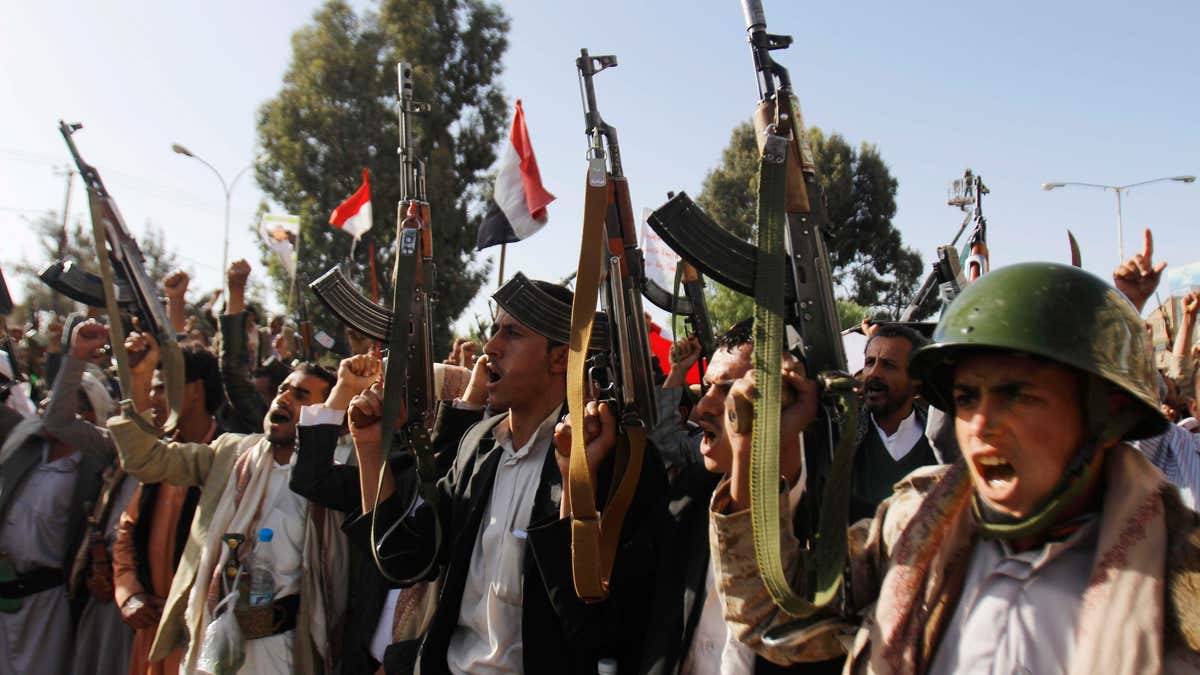
April 16, 2015: Shiite rebels, known as Houthis, chant slogans during a demonstration against an arms embargo imposed by the U.N. Security Council on Houthi leaders, in Sanaa, Yemen. (AP)
RIYADH, Saudi Arabia – Saudi Arabia said it shot down a Scud missile fired by Yemen's Shiite rebels and their allies early Saturday at a Saudi city that is home to a major air base, marking what could be a major escalation in the monthslong war.
Two missiles launched from a Patriot missile battery shot down the Scud around 2:45 a.m. Saturday (2345 GMT, 7:45 p.m. EDT Friday) around the southwestern city of Khamis Mushait, the official Saudi Press Agency reported. The agency did not report any casualties in the attack.
Khamis Mushait is home to the King Khalid Air Base, the largest such facility in that part of the country. Saudis on social media reported hearing air raid sirens go off around the city during the attack.
The agency blamed Iranian-backed Shiite rebels known as Houthis and their allies in forces loyal to former Yemeni President Ali Abdullah Saleh.
Saudi Arabia leads a coalition targeting the rebels in airstrikes that began March 26 in support of the country's exiled President Abed Rabbo Mansour Hadi. Those strikes have targeted arms caches and other Scud missile sites around the country.
The coalition responded to Saturday's attack by targeting and damaging the launcher, which was located south of the Houthi hub of Saada, according to the news agency.
Saudi Arabia is the world's largest oil exporter. Its major oil fields are located in the east of the country, far from Khamis Mushait.
The Houthis began their advance in September, sweeping into the Yemeni capital, Sanaa, and taking over government ministries and other areas. They held top officials, including Hadi, under house arrest until Hadi fled, first to the southern port city of Aden, then to Saudi Arabia as the rebels closed in backed by forces loyal to Saleh.
The Saudi-led air campaign and ground fighting have killed more than 1,000 civilians and displaced more than 1 million people since mid-March, the spokesman for the U.N. secretary-general, Stephane Dujarric, told reporters Wednesday.
The offensive has so far failed to force the Houthis to withdraw from any territory they hold or blunt their advance in southern Yemen.
On Friday, the Houthis and Saleh's forces launched a ground offensive targeting the Saudi border, which saw the kingdom fire artillery and launch Apache attack helicopters, the Saudi Press Agency reported.
The agency reported "scores" of rebel forces being killed in a battle that lasted from dawn to noon Friday, with four Saudi soldiers killed in the fighting.
The Saudis and Western powers accuse the Houthis of receiving military support from Shiite power Iran as part of a larger proxy war between the Sunni kingdom and the Islamic Republic across the Mideast. Tehran and the rebels deny the allegations, though Iran has acknowledged sending humanitarian aid to the Houthis.
The strikes, as well as a Saudi-led air and sea blockade, have caused food, water and medicine shortages, sparking a humanitarian crisis in the Arab world's poorest country.
The Soviet Union developed Scuds during the Cold War and exported the ballistic missiles to several countries, including Yemen.
A website allied with Saleh says the Yemeni army possesses 300 Scud missiles, most of them under the control of the Houthis and Saleh's forces.
In April, the spokesman for the Saudi-led coalition, Saudi Brig. Gen. Ahmed Asiri, implied that all the Scud missiles held in Yemen had been destroyed in airstrikes. "As coalition forces, we confirm that all Houthi capabilities were targeted, foremost their ballistic missiles," Asiri said.
Scud strikes in Saudi Arabia have been fatal in the past. On Feb. 25, 1991, an Iraqi-fired Scud evaded a Patriot strike and hit a U.S. base in Dhahran, Saudi Arabia, killing 28 American soldiers.
